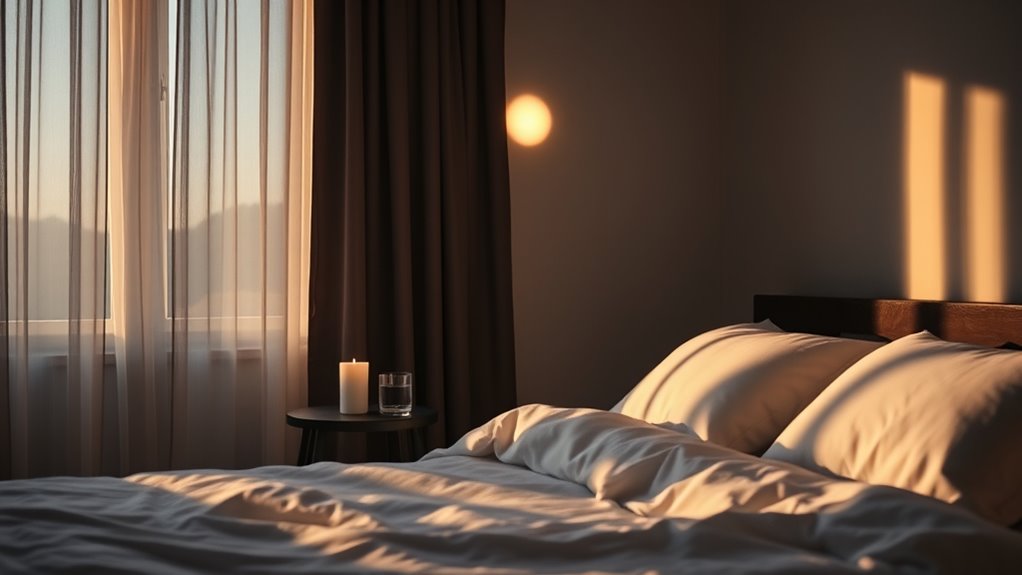To improve sleep tonight naturally, set a consistent schedule, and wind down with calming activities like reading or gentle stretches. Create a comfortable, dark, and cooler environment, and avoid screens an hour before bed to protect melatonin production. Keep electronic devices out of your bedroom and steer clear of caffeine and heavy meals late in the day. Small changes in your routine and environment can make a big difference—discover more tips to optimize your sleep tonight.
Key Takeaways
- Establish a consistent sleep schedule by going to bed and waking up at the same time daily.
- Keep your bedroom cool, dark, and quiet to enhance melatonin production and promote restful sleep.
- Avoid screens and blue light at least one hour before bed to prevent melatonin suppression.
- Engage in relaxing activities like reading or gentle stretching to wind down before sleep.
- Remove electronic devices from the sleeping area and create a calming environment for better sleep quality.

Getting a good night’s sleep is essential, and luckily, you don’t need pills to make it happen. The key lies in establishing effective bedtime routines and optimizing your sleep environment. Your bedtime routine sets the tone for restful sleep, signaling to your body that it’s time to wind down. Consistency is vital—going to bed and waking up at the same time every day helps regulate your internal clock, making it easier to fall asleep naturally. Incorporate calming activities like reading, gentle stretching, or listening to soothing music. Avoid screens at least an hour before bed because the blue light emitted from phones, tablets, and computers suppresses melatonin, the hormone that promotes sleep. Instead, try dimming the lights and engaging in relaxing activities that don’t stimulate your brain. Exploring the world of geometry online can also serve as a calming pre-sleep activity by engaging your mind in a gentle, non-stimulating way. Your sleep environment plays an important role in how well you rest. A cool, dark, and quiet room creates ideal conditions for sleep. Ideally, keep your bedroom temperature between 60-67°F (15-19°C), as cooler settings help your body lower its core temperature, which is necessary for sleep onset. Darkness is just as important—use blackout curtains or an eye mask to block out light, which can interfere with melatonin production. Noise can be disruptive, so consider using earplugs or a white noise machine to drown out disturbances. Your bed should be comfortable, with a supportive mattress and pillows that suit your preferences. Remove electronic devices from your sleeping area to prevent distractions and electromagnetic interference, which can disturb your sleep. Incorporating these changes into your nightly routine can markedly improve sleep quality without medication. By creating a predictable bedtime routine and a sleep-friendly environment, you help your body transition smoothly into rest mode. This consistency trains your brain to associate specific cues with sleep, reducing the time it takes to fall asleep. Remember, the goal isn’t just about getting enough hours but also about achieving quality rest. Avoid caffeine or heavy meals close to bedtime, and try to wind down at least 30 minutes before bed to prepare your mind and body for sleep. Small adjustments like these can make a big difference, helping you fall asleep faster and wake up feeling more refreshed, all without the need for pills.
Frequently Asked Questions
How Does Light Exposure Affect Sleep Quality?
Light exposure markedly impacts your sleep quality by regulating melatonin production and maintaining circadian alignment. When you get bright light during the day, it boosts alertness and helps set your internal clock. Conversely, exposure to blue light at night suppresses melatonin, making it harder to fall asleep. To improve sleep tonight, limit evening light and seek natural light during the day, supporting your body’s natural rhythms and enhancing sleep quality.
Can Certain Foods Promote Better Sleep Naturally?
Certain foods can help you sleep better naturally. Nutritious snacks like almonds, bananas, and yogurt provide magnesium and tryptophan, which promote relaxation. Herbal teas such as chamomile or valerian root soothe your mind and body before bed. Incorporating these into your evening routine can enhance sleep quality without medication, making it easier to fall asleep and stay asleep throughout the night.
What Role Does Stress Play in Sleep Disruption?
Think of stress as a fire that keeps your mind ablaze, making it hard to settle down. When you’re stressed, your body releases cortisol, a hormone that keeps you alert. This disrupts your sleep cycles, making restful sleep elusive. To improve sleep, focus on stress management techniques that help regulate cortisol levels. By calming your mind, you create the ideal environment for deep, restorative sleep tonight.
Are There Specific Sleep Routines Recommended for Shift Workers?
Shift workers should prioritize maintaining consistent sleep routines to support circadian rhythms and improve sleep hygiene. Try to go to bed and wake up at the same times, even on days off, to help your body adjust. Use blackout curtains and minimize light exposure during daytime sleep. Avoid caffeine and electronics before bed, and create a relaxing environment. These habits help stabilize your circadian rhythms and promote better sleep quality.
How Does Sleep Environment Influence Sleep Onset and Duration?
Your sleep environment plays a crucial role in sleep onset and duration. Good sleep hygiene involves creating a bedroom setup that’s cool, dark, and quiet to promote relaxation. Use blackout curtains and minimize noise to make your space more sleep-friendly. A comfortable mattress and limiting screen time before bed also help. By optimizing your bedroom setup, you make it easier to fall asleep faster and enjoy longer, more restful sleep.
Conclusion
Now that you know these science-backed tips, tonight could be the start of better sleep. But what if one small change makes all the difference? Will you try them all or just a few? The key is in your hands—your next night’s rest could hold the secret to waking up refreshed. Don’t wait too long to find out—your best sleep might be closer than you think. Are you ready to discover it?









